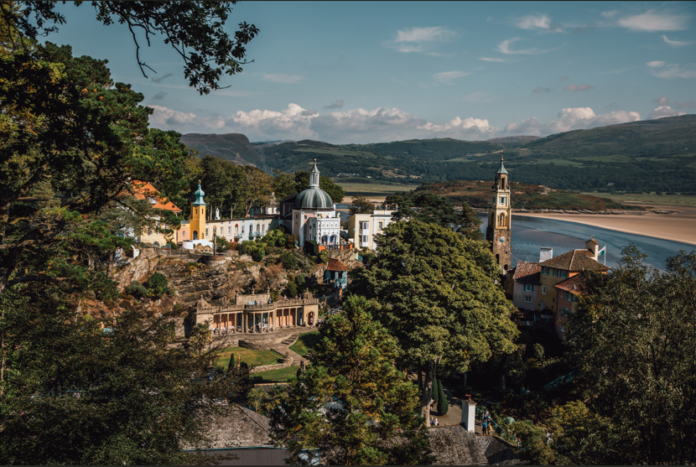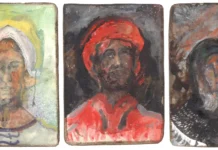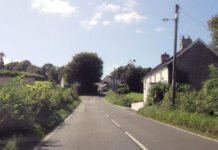With its 870 miles of breathtaking coastal views, there’s no prizes for guessing why the Wales Coast Path has featured in so many iconic films and TV shows.
From way back in 1913 to the present day, the roaring Welsh coast has set the scene for countless epic battles, farcical comedies, and exciting dramas on film — appearing in everything from Doctor Who to Game of Thrones and Harry Potter.
These global hits are regularly cited as reasons for overseas tourism to Wales and there’s no sign of it stopping — with thanks to House of the Dragon, which returned to Wales for season two, shooting several scenes along the north Wales coast from Llanddwyn Island to Penmon.
Set to air in summer 2024, it’s hoped that the Game of Thrones spin-off will drive even more visitors to explore the wonders of the Wales Coast Path. But until then, we invite you to explore the other cinematic wonders that have graced our coastline over the years…
Ivanhoe (1913):
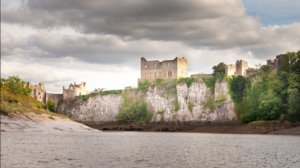
Now over 100 years old, this black-and-white classic was shot within the ancient walls of Chepstow Castle. While it’s likely that lead American actor, King Baggot, would have felt right at home on set at the medieval castle — having found a place to suit his royal name — it’s also probable that this was one of the first representations of Wales on film.
Moby Dick (1956):
The dramatic coastal landscape and tumultuous seas of Pembrokeshire provided a perfect backdrop for this timeless tale of a great white whale. A-list stars of the day, Gregory Peck and Orson Welles, took to Fishguard, Cemaes Head and Ceibwr Bay as part of this iconic retelling of Herman Melville’s classic 1851 novel.
The Prisoner (1967-68):
This iconic TV series tells the story of a secret agent who is abducted and taken to what looks like an idyllic village… but it’s a prison! And the filming location? None other than Portmeirion, an enchanting 1920s Italianate village in Gwynedd.
The Prisoner was a huge global hit in the 1960s — putting Wales on the map across the USA, Australia, the UK, and wider Europe. Even The Beatles were said to be fans! Portmeirion isn’t actually on the Wales Coast Path, but it’s very close — and well worth veering off to explore its colourful buildings and lush woodland walks.
Monty Python and the Holy Grail (1975):
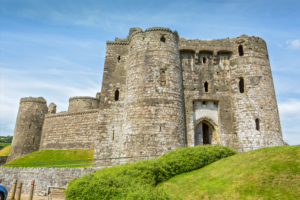
The 900+ year-old coastal castle of Kidwelly features in the famous opening scene of Monty Python and the Holy Grail. You know the one. King Arthur rides on an invisible horse while his ward creates ridiculous hoof sounds with coconut shells behind him. The scene is almost as timeless as the coastline itself!
Die Another Day (2002):
The twentieth film in the James Bond series, Die Another Day, comes to an end in Wales — with Penbryn Beach in Ceredigion standing in for a North Korean beach in a steamy end of movie scene.
Doctor Who (2005-present):
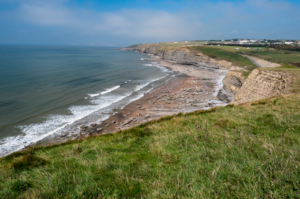
How could we leave Doctor Who off this list? After all, it’s the show’s 60th anniversary year! Filming at locations all over Wales since the show’s return in 2005, the Doctor is a frequent visitor of Wales’ coastline — but a firm favourite location of the production team is Southerndown Beach near Bridgend. Also known as Dunraven Bay, the hidden beach has featured in several episodes — but Whovians will remember it best for a heartbreaking scene featuring David Tennant and Billie Piper (we’ll say no more!)
The Edge of Love (2008):
This romantic classic starring Kiera Knightley, Sienna Miller, Cillian Murphy, and Matthew Rhys tells the story of famous Welsh poet, Dylan Thomas. The star-studded cast traversed the coast of west Wales during production — filming everywhere from Dylan’s hometown of Laugharne to Tenby and New Quay.
Harry Potter and the Deathly Hallows part 1 (2010):
Freshwater West Beach in Pembrokeshire is the setting of the tragic death and burial of much-loved character, Dobby the House Elf. In the film, Dobby is buried in the sand dunes on the northern end of the beach — just a short walk from the north car park. However, his ‘grave’ is marked further south with hundreds of fan-placed stones with messages and a few socks (not to be encouraged as they are not biodegradable!).
Hinterland / Y Gwyll (2013-2016):
The quaint coastal town of Aberystwyth is the main base of moody detective drama, Hinterland — but the show does delve further along the Wales Coast Path, filming everywhere from Ynyslas Sand Dunes near Cardigan Bay to Smugglers’ Cove Boat Yard in Aberdyfi. Here’s a handy map to help fans find specific filming locations.
You’ll see that the vast majority of filming took place in Ceredigion and — bordered by the towering Cambrian Mountains on one side and 100km of stunning coastline on the other — it’s easy to see why. We can’t imagine a better location to incite a bit of mystery!
The Crown (2019):
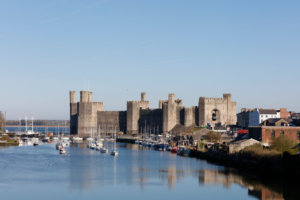
Season Three of The Crown features several Welsh locations — with episodes covering everything from the Aberfan disaster to Prince Charles’ investiture in the 1960s. Recognisable places on the Wales Coast Path include various spots on Aberystwyth seafront; the Severn Crossing; and of course, Caernarfon Castle — the medieval setting of the investiture itself.
Meanwhile, this year, House of the Dragon was filmed at several coastal locations in north Wales — from Newborough Beach on Anglesey to Trefor on on the northern coast of the Llŷn Peninsula. Welsh viewers will have to see how many places they can recognise when the show airs next summer. Watch this space!
For more information or to plan your cinematic coastal adventure, visit the Wales Coast Path website or follow @WalesCoastPath on Facebook, X and Instagram.

| [donate]
| Help keep news FREE for our readersSupporting your local community newspaper/online news outlet is crucial now more than ever. If you believe in independent journalism,then consider making a valuable contribution by making a one-time or monthly donation. We operate in rural areas where providing unbiased news can be challenging. |
















